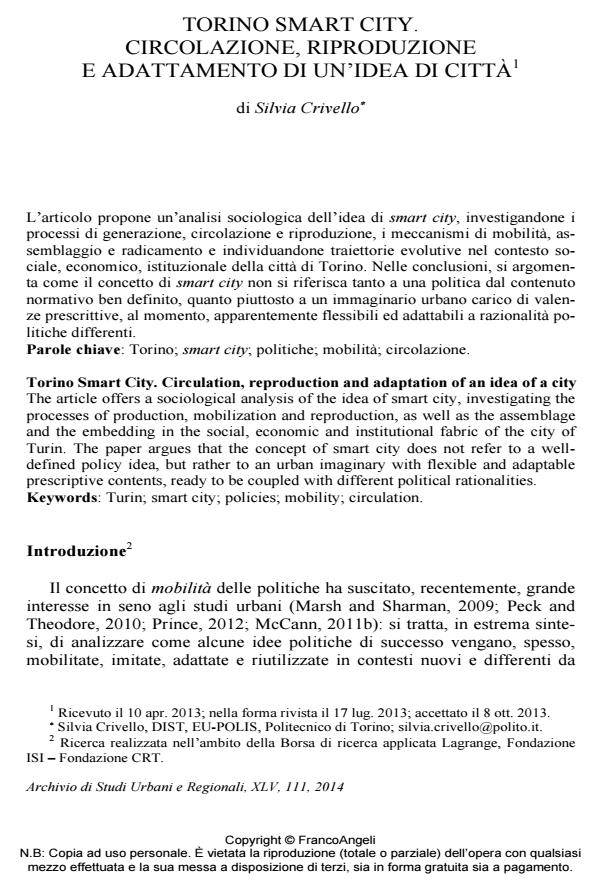Torino smart city. Circolazione, riproduzione e adattamento di un’idea di città
Titolo Rivista ARCHIVIO DI STUDI URBANI E REGIONALI
Autori/Curatori Silvia Crivello
Anno di pubblicazione 2015 Fascicolo 2014/111 Lingua Italiano
Numero pagine 17 P. 32-48 Dimensione file 97 KB
DOI 10.3280/ASUR2014-111002
Il DOI è il codice a barre della proprietà intellettuale: per saperne di più
clicca qui
Qui sotto puoi vedere in anteprima la prima pagina di questo articolo.
Se questo articolo ti interessa, lo puoi acquistare (e scaricare in formato pdf) seguendo le facili indicazioni per acquistare il download credit. Acquista Download Credits per scaricare questo Articolo in formato PDF

FrancoAngeli è membro della Publishers International Linking Association, Inc (PILA)associazione indipendente e non profit per facilitare (attraverso i servizi tecnologici implementati da CrossRef.org) l’accesso degli studiosi ai contenuti digitali nelle pubblicazioni professionali e scientifiche
L’articolo propone un’analisi sociologica dell’idea di smart city, investigandone i processi di generazione, circolazione e riproduzione, i meccanismi di mobilità, assemblaggio e radicamento e individuandone traiettorie evolutive nel contesto sociale, economico, istituzionale della città di Torino. Nelle conclusioni, si argomenta come il concetto di smart city non si riferisca tanto a una politica dal contenuto normativo ben definito, quanto piuttosto a un immaginario urbano carico di valenze prescrittive, al momento, apparentemente flessibili ed adattabili a razionalità politiche differenti.;
Keywords:Torino; smart city; politiche; mobilità; circolazione
- Castells M. (1996). Rise of the Network Society: The Information Age. Cambridge: Blackwell. Castells M. and Hall P. (1994). Technopoles of the World. London: Routledge.
- Coe A., Paquet G. and Roy J. (2001). E-Governance and Smart Communities. A Social Learning Challenge, Social Science Computer Review, 19(1): 80-93.
- Cook I.R. (2008), Mobilising urban policies: The policy transfer of US Business Improvement Districts to England and Wales. Urban Studies, 45(4): 773-795.
- Dolowitz D. and Marsh D. (1996). Who learns what from whom: A review of the policy transfer literature. Political Studies, 44(2): 343-357.
- Eger J. (1997). Smart Growth, Smart Cities, and the Crisis at the Pump. A Worldwide Phenomenon. I-Ways: The Journal of E-Government Policy and Regulation, 32(1): 47-53.
- Florida R. (2002). The Rise of the Creative Class. And How It’s Transforming Work, Leisure, Community, and Everyday Life. New York: Basic Books.
- Florida R. (2008). Who’s your city? New York: Basic Books.
- Fraser N. (2003). From discipline to flexibilization? Rereading Foucault in the shadow of globalization. Constellations, 10: 160-171.
- Giffinger R., Fertner C., Kramar H., Kalasek R., Pichler-Milanovic N. and Meijers E. (2007). Smart cities. Ranking of European medium-sized cities, disponibile al sito: http://www.smart-cities.eu.
- Graham S. and Marvin S. (1996). Telecommunications and the City: Electronic Spaces, Urban Places. London: Routledge.
- Graham S. and Marvin S. (2001). Splintering urbanism: Networked infrastructures, technological mobilities, and the urban condition, London: Routledge.
- Harvey D. (1989). From managerialism to entrepreneurialism: The transformation in urban governance in late capitalism. Geografiska Annaler B, 71(1): 3-17.
- Hollands R. (2008). Will the real smart city please stand up? Intelligent, progressive or entrepreneurial? City, 12(3): 303-320.
- Marsh D. and Sharman J.C. (2009). Policy diffusion and policy transfer. Policy Studies, 30(3): 269-288.
- McCann E. (2008). Expertise, truth, and urban policy mobilities: Global circuits of knowledge in the development of Vancouver, Canada’s ‘four pillar’ drug strategy. Environment and Planning A, 40(4): 885-904.
- McCann E. (2010). Urban Policy Mobilities and Global Circuits of Knowledge: Toward a Research Agenda. Annals of the Association of American Geographers, 101, 1: 107-130.
- McCann E. (2011a). Veritable inventions: Cities, policy and assemblage. Area, 43(2): 143-147.
- McCann E. (2011b). Urban policy mobilities and global circuits of knowledge: Toward a research agenda. Annals of the Association of American Geographers, 101(1): 107-130.
- McCann E. and Ward K. (2010). Relationality/territoriality: toward a conceptualization of cities in the world. Geoforum, 41(2): 175-184.
- Peck J. (2002). Political economics of scale: Fast policy, interscalar relations and neoliberal workfare. Economic Geography, 78: 331-360.
- Peck J. (2003). Geography and public policy: Mapping the penal state. Progress in Human Geography, 27: 222-232. Peck J. (2005). Struggling with the creative class. International Journal of Urban and Regional Research, 29: 740-770.
- Peck J. and Theodore N. (2001). Exporting workfare/importingwelfare-to-work: Exploring the politics of Third Way policy transfer. Political Geography, 20: 427-460.
- Peck J. and Theodore N. (2010). Mobilizing policy: models, methods, and mutations. Geoforum, 41: 169-174.
- Peck J. and Tickell A. (2002). Neoliberalizing space. Antipode, 34: 380-404.
- Pieterse J.N. (2009). Globalization and Culture: Global Mélange. Lanham, MD: Rowman and Littlefield.
- Prince R.J. (2010). Policy transfer as policy assemblage: Making policy for the creative industries in New Zealand. Environment and Planning A, 42(1): 169-186.
- Prince R.J. (2012). Policy transfer, consultants and the geographies of governance. Progress in Human Geography, 36(2): 188-203.
- Rose R. (1993). Lesson-drawing in public policy. Chatham, NJ: Chatham House Publishers.
- Simmons B.A., Dobbin F. and Garrett G. (2008). Introduction: The diffusion of liberalization. In: Simmons B.A., Dobbin F. and Garrett G., eds., The Global Diffusion of Markets and Democracy. New York: Cambridge University Press.
- Smart Growth Network (2013). http:www.smartgrowth.org (ultimo accesso 01/03/2013).
- Thorns D. (2002). The Transformation of Cities: Urban Theory and Urban Life. Basingstoke: Palgrave.
- Walker J.L. (1969). The diffusion of innovations among the American states”. American Political Science Review, 63(3): 880-899.
- Smart city e adattamento ai cambiamenti climatici: i casi Genova e Copenhagen a confronto Samantha Cenere, in ARCHIVIO DI STUDI URBANI E REGIONALI 118/2017 pp.141
DOI: 10.3280/ASUR2017-118007
Silvia Crivello, Torino smart city. Circolazione, riproduzione e adattamento di un’idea di città in "ARCHIVIO DI STUDI URBANI E REGIONALI" 111/2014, pp 32-48, DOI: 10.3280/ASUR2014-111002